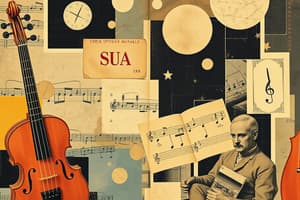Podcast
Questions and Answers
What characterizes impressionism in music?
What characterizes impressionism in music?
- A strong focus on traditional harmonic structures.
- The creation of emotional moods through vague melodies and innovative chords. (correct)
- An emphasis on depicting reality explicitly.
- The use of rigid melodies and clear resolutions.
Which of the following composers is associated with the impressionist movement?
Which of the following composers is associated with the impressionist movement?
- Maurice Ravel (correct)
- Igor Stravinsky
- Bela Bartok
- Claude Debussy (correct)
What is a defining feature of expressionism in music?
What is a defining feature of expressionism in music?
- A focus on serene and stable harmonies.
- The use of atonality and the twelve-tone scale to express strong emotions. (correct)
- A strict adherence to classical forms and structures.
- Incorporation of traditional folk themes.
Neo-classicism is best described as:
Neo-classicism is best described as:
Which of the following statements accurately describes avant garde music?
Which of the following statements accurately describes avant garde music?
What does impressionism lack that is typically found in classical music?
What does impressionism lack that is typically found in classical music?
Which aspect of neo-classicism serves as a moderating influence?
Which aspect of neo-classicism serves as a moderating influence?
How does expressionism differ from impressionism in musical expression?
How does expressionism differ from impressionism in musical expression?
Flashcards are hidden until you start studying
Study Notes
Overview of 20th Century Musical Styles
- Emergence of distinct musical styles reflecting a departure from traditional classical music.
- Key styles include impressionism, expressionism, neo-classicism, avant-garde music, and modern nationalism.
Impressionism
- French movement prevalent in the late 19th and early 20th centuries.
- Emphasizes moods and impressions over the dramatic emotionalism of the Romantic Period.
- Utilizes extensive colors, vague melodies, and innovative chords leading to mild dissonances.
- Features new combinations of extended chords, whole tone, chromatic scales, and pentatonic scales.
- Focuses on suggesting emotional moods rather than depicting reality.
- Characterized by overlapping sounds of different chords that create subtle musical colors.
- Lacks a definitive order or clear resolution typical in traditional music, promoting harmonic vagueness.
Impressionism Composers
- Notable composers include Claude Debussy and Maurice Ravel.
Expressionism
- Aims to reveal the composer’s inner thoughts and emotions rather than environmental impressions.
- Utilizes atonality and the twelve-tone scale, rejecting stable and conventional harmonies.
- Serves as a medium for expressing intense emotions like anxiety, rage, and alienation.
Neo-Classical Music
- Acts as a moderating force between the Romantic era's emotional extremes and expressionism’s volatility.
- Represents a partial return to Classical writing styles, emphasizing tightly-knit forms.
- Combines tonal harmonies with slight dissonances, adopting a modern use of the seven-note diatonic scale.
Neo-Classical Composers
- Noteworthy composers include Igor Stravinsky and Bela Bartok.
Avant-Garde Music
- Closely linked to electronic music, focusing on the dimensions of sound in space.
- Introduces a new approach to musical mobility, allowing for varied orders of note groups to alter musical continuity.
- Emphasizes unconventional methods of sound and form, breaking away from traditional rules of harmony, melody, and rhythm.
- The avant-garde style can be challenging for listeners accustomed to conventional music.
Avant-Garde Composers
- Important figures in avant-garde music include George Gershwin, Leonard Bernstein, John Cage, and Philip Glass.
Studying That Suits You
Use AI to generate personalized quizzes and flashcards to suit your learning preferences.




